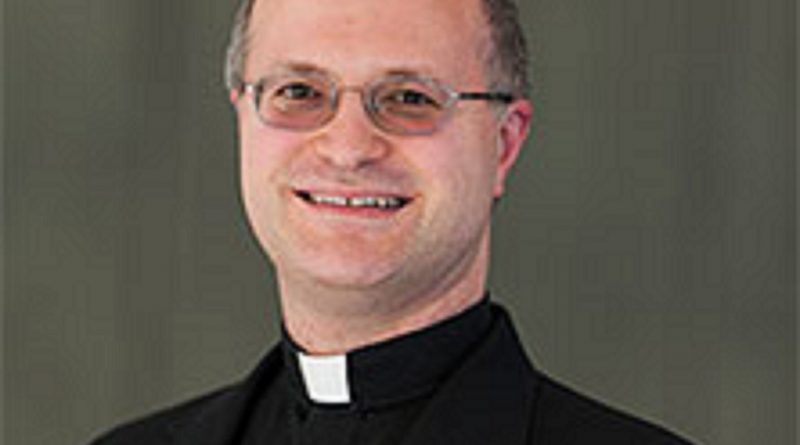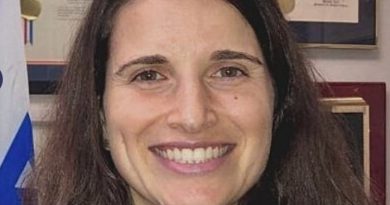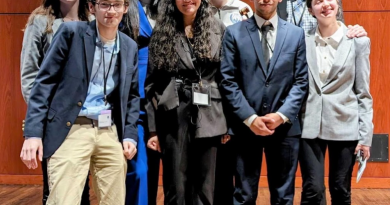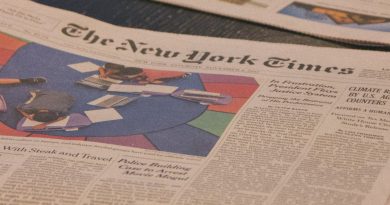Father Brian Muzás Awarded Stanton Nuclear Security Fellowship at Council on Foreign Relations
Harshana Ghoorhoo
International News Editor
Known for his expertise in nuclear issues in international affairs, Father Brian Muzás has recently been awarded the Stanton Nuclear Security Fellowship at the Council on Foreign Relations. As a Stanton Fellow, Muzás will be in residence full-time at the Foundation located in New York City. In a recent interview, he spoke about his Fellowship and his current research focus.
After receiving his B.S.E in mechanical and aerospace engineering from Princeton University in 1996, Muzás used a National Science Foundation scholarship to obtain an M.S. in aeronautics from the California Institute of Technology. In 2003, Muzás was ordained a Catholic priest after receiving an M.Div. in pastoral ministry and an M.A. in systematic theology. Finally, in 2013 he received his Ph.D. in Public Policy from the University of Texas Austin. He is currently an Assistant Professor at the School of Diplomacy where he has taught a variety of undergraduate and graduate graduate courses in human security, statecraft, and nuclear weapons in the international community.
Muzás has undoubtedly had a very fascinating journey in academia, combined with priesthood. As a Stanton Fellow, he is using the intersectionality between his interest in nuclear security and his theological and historical background to work on a book project about the influence of religious cultural heritage on the nuclear decisions of a number of Cold War presidents. Stanton Nuclear Security Fellows are expected to work on a project of their own design by undertaking original research and writing a policy document.
“My book project is an exploration of the influence of religious cultural heritage on the nuclear decision-making of Presidents Truman, Eisenhower, Carter, and Reagan.” Muzás hopes to learn lessons from previous historical occurrences to help us better understand the present. His research will draw on work he has done at the presidential libraries maintained by the National Archives and Record Administration as well as at CFR this year.
There are currently eight fellows joining CFR, including two Stanton Nuclear Security Fellows. There are five military fellows, one from each service. The three from the Army, Air Force, and Marines are Colonels and the ones from the Navy and Coastguards are Captains, each with a powerful and accomplished background. Muzás views this as an opportunity to interact with brilliant minds during regular meetings and briefings, where they discuss topics which he may or may not be familiar with.
“I want to get to the end of the year feeling that I have learned everything that I can from all these people,” Muzás said. “They have such wonderful backgrounds and experiences that I can’t wait to learn all their lessons.” CFR has a lot of resources and support in terms of writing, communications, and the press to which Muzás is looking forward. “Because I am not teaching this semester, [the fellowship] gives me the opportunity to research, write, and make professional and interpersonal connections.”
Muzás is also heavily involved with the U.S.-Pakistan Inter-religious Coalition (UPIC). Over the summer, COVID-19 made travel to Pakistan impossible. In response, UPIC, which is now under the wing of the Center for UN and Global Governance Studies which Muzás directs, partnered with Just Results, a social enterprise, and GIFT University in Pakistan. They put on a three-day virtual conference called Just Future in July which had an attendance of over 300,000 people. Prime Minister Imran Khan sent his National Security Advisor, Moeed Yusuf, to speak on his behalf. “This means that UPIC, in some sense, has penetrated the consciousness of the highest levels of the government of Pakistan,” Muzás said. This development provides a potential opportunity for Muzás to utilize part of his time at CFR as a Stanton Fellow “to investigate U.S. and Pakistani nuclear decision-making in comparative perspective vis-à-vis cultural heritage.”
When asked how this fellowship will change his approach towards the courses he teaches, Muzás said: “I expect to interact with brilliant minds who will give me new ideas and point me in the direction of new sources I have not focused on.”
“I am hoping to become a better scholar because of my book, and even though [the book project] is all about writing, it influences teaching because it makes you think differently about how to convey the knowledge that you have.”
Muzás pointed out that it was Dr. Sara Moller, Assistant Professor at the School of Diplomacy, who encouraged him to apply for the Stanton Fellowship. As a result of her encouragement and the support of Muzás’ former doctoral advisors, he was selected as a recipient of the prestigious fellowship. Muzás’ recognition for his expertise and in-depth knowledge in his field attests to the great minds which the diplomacy faculty is comprised of.




